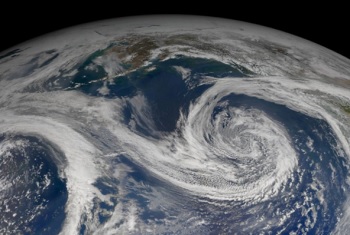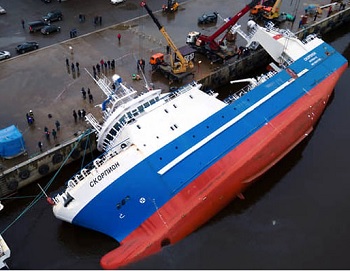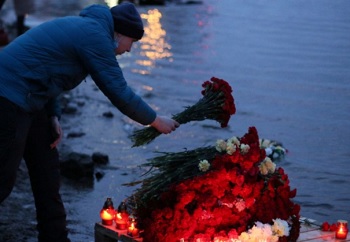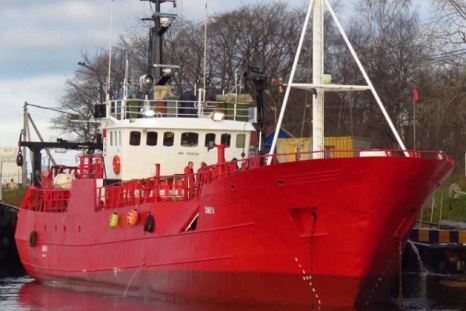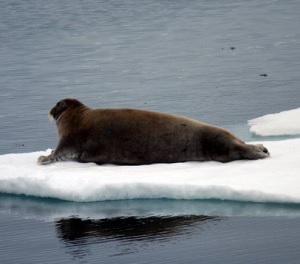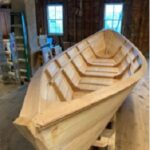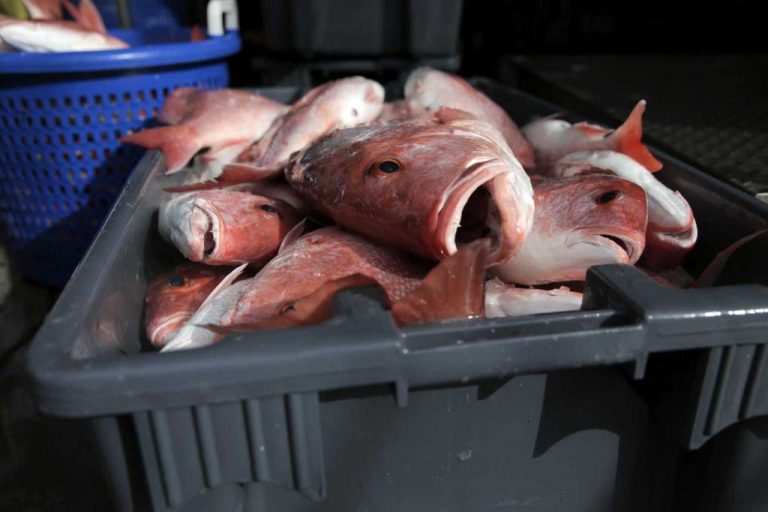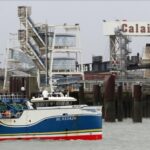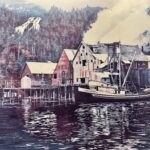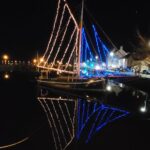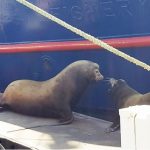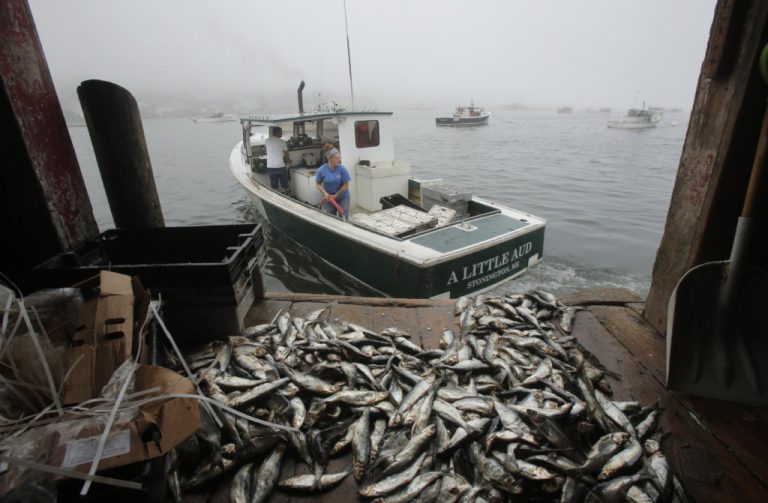Tag Archives: Russia
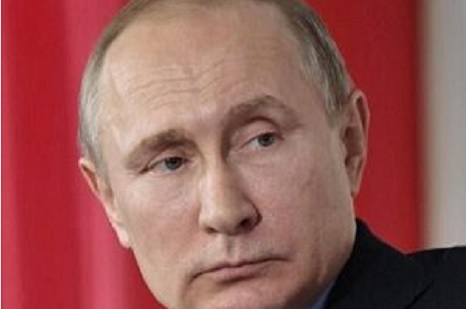
Should Russia be kicked out of NAFO; its trawler fleet banned from fishing outside Canadian waters?
There’s a case for it considering Canada has closed its airspace to Russian aircraft, and even a call by hockey legend Wayne Gretzky for Russia to be banned from the rescheduled World Juniors this summer in Alberta as a consequence for the country’s invasion of Ukraine. Offshore trawlers from the Russian Federation have access to thousands of tonnes of quota a year in the NAFO zone, including redfish, turbot, and skate. Kicking Russia out of NAFO and banning its offshore draggers from the area (if that’s possible), could be another message to President Vladimir Putin that his invasion of the Ukraine is unacceptable. Below are the NAFO quota tables for 2022, including a breakdown of fish set aside for Russia. >click to read< 09:34
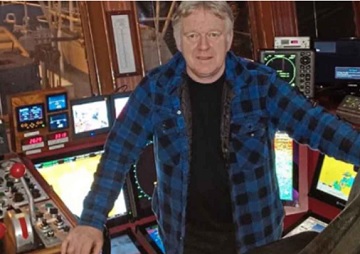
Cork fishermen reveal concerns over Russian submarines as they head off to sea
Kenny Oates, captain of the F/V Anders Nees, headed to sea last night with his six crew members for their first expedition of 2022 in search of hake, which swim close to the ocean floor. But Mr Oates admitted he is concerned that Russian subs could get caught in deep-sea fishing nets and pull down a trawler. He said: ‘We have seen it happen in Ireland, we have seen it happen in Scotland. It makes all fishermen very, very nervous.’ ‘You have all these international war games going on at sea and the fishermen are just trying to do their job, not knowing what is really going on,’ he said. >click to read< 09:09
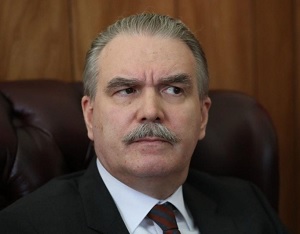
Updated: “Absolute Guarantee” – Wait! There is no Guarantee!
Irish fishing industry meets Russian ambassador over planned naval exercises -Representatives of Ireland’s fishing industry have been issued with an “absolute guarantee” by Russia’s ambassador that their work will not be impacted by Russian naval exercises scheduled for next week. The Irish government confirmed on Sunday that Russia plans to conduct naval and air exercises 240 kilometres off the southwestern coast of Ireland in international waters that lie within Ireland’s exclusive economic zone. >click to read< 07:30
Russians deny fishermen’s claims on naval drills ‘buffer zone’ – In a statement on Friday morning, the Russian Embassy rejected reports based on the statements from the fishing representatives on Thursday that there had been “some kind of ‘agreement’ on some kind of ‘buffer zones’ in the area of the upcoming drills of the Russian Navy in the Atlantic.” >click to read< 08:28
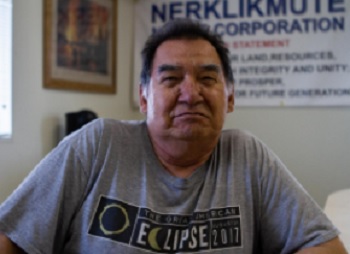
Why Are The Chum Runs So Low? It’s not just an Alaskan/Yukon phenomenon.
The State of Alaska has closed fishing for chum to protect the runs. For Yukon River families, chum is particularly important. Chinook salmon have been low for decades, but chum were the fish families could depend on until last year, when the summer chum run dropped below half of its usual numbers. This year the run dropped even further, to record lows. Biologist Katie Howard with the Alaska Department of Fish and Game said that the chum declines are not just occurring in the Yukon River. “When we talk to colleagues in the lower 48 and Canada, Japan, Russia, they are all reporting really poor chum runs. So it’s not just a Yukon phenomenon. It’s not just an Alaska phenomenon, but pretty much everywhere,” So why are the chum numbers so low? The short answer is no one really knows for sure. >click to read< 10:38
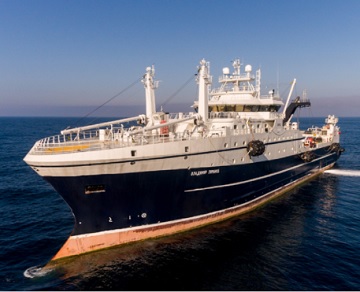
Russian Fishery Company’s flagship supertrawler F/V Vladimir Limanov arrives in Vladivostok port
After successful fishing trials, the flagship supertrawler “Vladimir Limanov” owned by the Russian Fishery Company arrives in Vladivostok for scheduled customs clearance and presentation to the Russian Maritime Register of Shipping, RFC says in its press release. During the voyage, F/V “Vladimir Limanov” underwent a number of inspections to determine the efficiency and reliability of the new vessel in real operating conditions. Leading Russian and Japanese food companies have already appreciated the first batches of high-quality products. The vessel is ready for operation and can set out on a fishing voyage. >click to read< 18:54
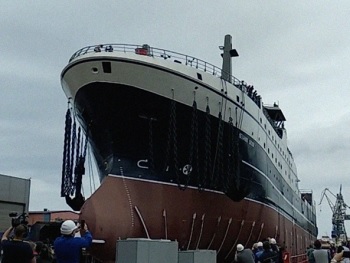
State of the art super trawler Mekhanik Sizov launched in Russia
The Admiralty Shipyards, located in St. Petersburg, have been the scene this Sunday of the launching ceremony of the super trawler of last generation Mekhanik Sizov. The ceremony, held during the day of Russian Navy Day, was attended by the country’s president, Vladimir Putin. Ships of this type measure 108 meters in length and 21 meters in beam. In addition, they have warehouses of 5,500 cubic meters. The ST-192 project ships reach a speed of 15 knots (almost 28 kilometers per hour), while their autonomy allows them to remain in the open sea for 45 days with a crew on board up to 139 members. photo, gif, >click to read< 13:21
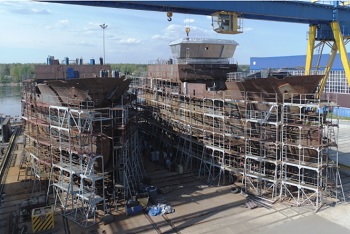
Crab Goes to Auction Again
Russia’s Federal Agency for Fisheries has rolled out plans to run a second round of crab quota auctions. This is not likely to happen soon, as among other reasons, because there is simply no capacity to build crabbers in Russia’s Far East. ‘Federal Agency for Fisheries is working on the second round of crab auctions,’ confirmed the Agency’s director Ilya Shestakov, adding that just like during the first round, quotas are planned to be sold with “investment liabilities.” It is estimated that the first-round winners embarked on the construction of 35 crabbers with a total value of 57.4 billion rubles ($800 million). >click to read< 13:50
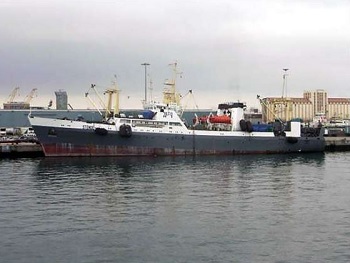
Fish Trawler With Over 80 People On Board Has Caught Fire In Sea Of Okhotsk
A fish trawler with over 80 people on board has caught fire in Russia’s Sea of Okhotsk, there is no threat of sinking, according to preliminary information, a spokesman for the regional emergency services told Sputnik on Thursday. “The burning trawler is around 200 kilometers [124 miles] away from Magadan, the holds of the vessel are in flames,” the spokesman said, adding that there are over 80 people on board. No injuries have been reported so far, the spokesman went on to say. >link< 21:18
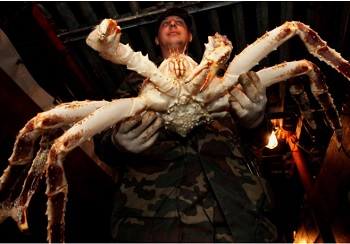
Russia’s wealthiest official arrested over links to ‘Crab King’ murder & smuggling cases
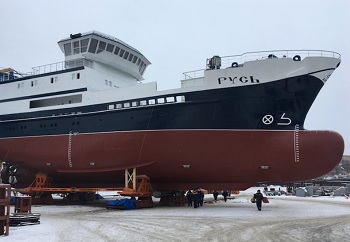
Russia Sells Deep Sea Crab Quota
On the fourth attempt, the Russian government has found a fishing company willing to buy deep-sea crab quotas, but Far Eastern fishermen expect this will be a hollow victory. Deep-sea crab quotas have been a headache for the Russian authorities for the past year. The Federal Agency for Fisheries ran three auctions since October of 2019, but each time with no bidders. The idea of selling crab quotas through auctions have been consistently criticised by Russian fishermen, as wreaking havoc on the entire industry. >click to read< 12:28
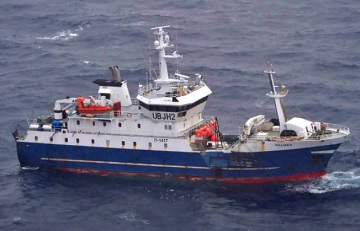
Russia and NZ in ‘knock out brawl’ over fishing vessel in protected Antarctic waters
Russia has accused New Zealand of falsifying evidence in a diplomatic clash over illegal fishing in protected waters around Antarctica. New Zealand and many allies rejected the accusation,,, On January 19 last year, a routine New Zealand surveillance flight over the Southern Ocean spotted a Russian-flagged ship called FV Palmer fishing in a marine protected area where fishing is banned by international agreement. The Palmer’s satellite tracker, officially called a “vessel monitoring system” ,or VMS, indicated the vessel was about 800 nautical miles (1500 kilometres) from that spot. >click to read< 15:44
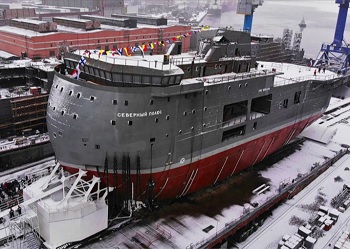
Russia’s New Long-Endurance Arctic Research Vessel Might Be The Ugliest Ship We’ve Seen
The Admiralty Shipyard in Saint Petersburg, which is part of Russia’s United Shipbuilding Corporation, launched the North Pole on December 18, almost exactly two years after construction began. The vessel has been built for the Federal Service for Hydrometeorology and Environmental Monitoring, better known as Roshydromet, at a reported cost of $100 million. It is being run as a joint project between Roshydromet and Russia’s Arctic and Antarctic Research Institute. Measuring 276 feet long by 74 feet wide, and with a displacement of 10,225 tons, the North Pole is intended to be the first vessel of its kind to be permanently based in the high Arctic. photos, >click to read< 18:34
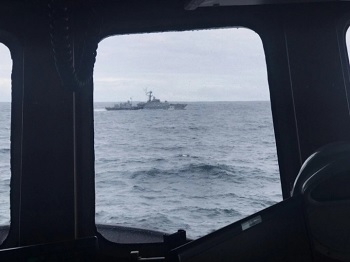
‘Are We Getting Invaded?’ U.S. Fishing Boats Faced Russian Aggression Near Alaska
Capt. Steve Elliott stood dumbfounded on the trawler Vesteraalen as three Russian warships came barreling through, barking orders of their own. On the ship Blue North, commands from a Russian plane led Capt. David Anderson to contact the U.S. Coast Guard, wondering how to protect his crew of 27.,, “The Coast Guard’s response was: Just do what they say.” This summer, Russia’s military operated in the Bering Sea, home to America’s largest fishery, where boats haul up pots crawling with red king crab, and trawlers dump nets filled with 200 tons of pollock onto their decks. >click to read< 18:26
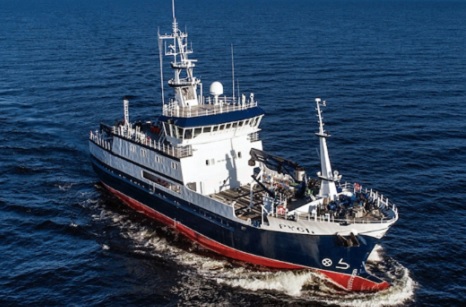
New Russian Crab Fleet Takes Shape
Following the delivery of Rus, Pella is making progress on two more crabbers to the same design, ordered for Sakhalin-based company Ostrovnoy-Krab. In the Far East, the Nakhodka Ship Repair Yard has contracted to build eight crabbers to a design developed by Damen – six for Antey and two for the Pacific Fishing Company (TRK). The first three of this series of crabbers designed to land fresh catches are scheduled to be in the water before the end of this year, with the series as a whole to be completed between 2021 and 2024. >photo’s, click to read< 16:27
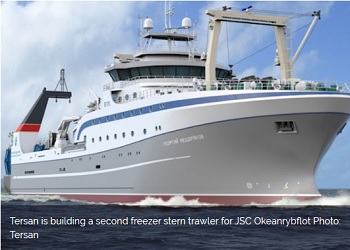
Tersan Shipyard has signed a new contract for a second freezer stern trawler
The new vessel will be among the world’s largest purpose-built factory trawlers and will trawl Alaska pollock in the Sea of Okhotsk, as well as herring, mackerel and pollock in the Pacific. The vessel is arranged for pelagic and semi-pelagic trawling, using two main trawl winches working in combination with ice trawl gallows and four large pelagic sweep line drums. The Skipsteknisk designed vessel will be 108 by 20 metres with accommodation for up to the 150 people on board,,, >click to read< 16:25
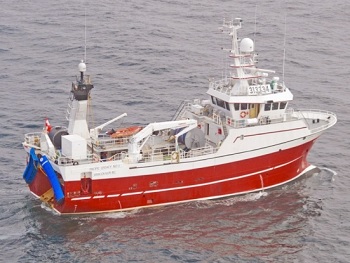
International Scientific Expedition to probe Pacific salmon survival
“While we recognize that ocean and climate conditions are major factors regulating salmon abundances, the mechanisms regulating abundances in the ocean are not known,” B.C. scientists Richard Beamish and Brian Riddell,, Scientists are seeking to provide more accurate forecasts of salmon returns during what Beamish and Riddell say might be the most difficult time in recent history for stewardship of Pacific salmon.,, The survey takes place as B.C. fishermen fear disastrous returns this year following poor returns for much of the coast last year. >click to read< 18:56
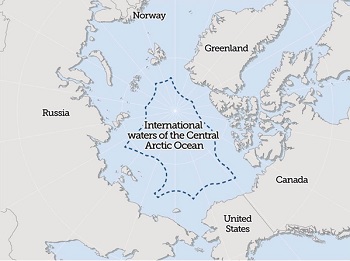
U.S. ratifies The Agreement to Prevent Unregulated High Seas Fisheries in the Central Arctic Ocean
The United States has become the fourth jurisdiction after Canada, the European Union and Russia to ratify a landmark international agreement that aims to prevent unregulated commercial fishery in the high seas of the Central Arctic Ocean, officials at the State Department announced Tuesday. The Agreement to Prevent Unregulated High Seas Fisheries in the Central Arctic Ocean, which was signed in Ilulissat, Greenland last October, includes the so-called Arctic Five – Canada, Norway, Russia, Denmark (Greenland and the Faroe Islands), the U.S. – as well as the major fishing nations – Iceland, Japan, South Korea, China and the EU. >click to read< 17:56
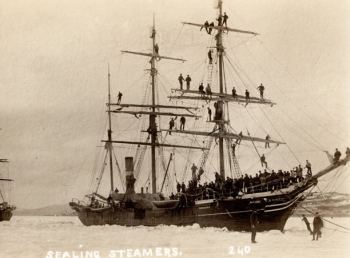
The real Sea Wolf: Russians try to tame ‘Sea Wolf’ Captain Alexander MacLean (Part 2)
After being caught almost red-handed poaching seals from a Russian island, Captain MacLean was summoned, along with most of his crew, to appear aboard the Russian warship Alert. This he complied with, but once aboard the Russian warship, a fight broke out and eventually the Americans were overpowered. A prize crew was then sent to the schooner. According to MacLean, “the American flag was floating at the masthead, and as the halyards were hammed and cut, it was no easy matter to get down. Several attempts were made but were unsuccessful. >click to read< 12:06
The real Sea Wolf: Captain Alexander MacLean (Part 1) – >click to read<

The real Sea Wolf: Captain Alexander MacLean (Part 1)
Many people are aware that Jack London spent time in Korea as a war correspondent during the Russo-Japanese War (1904-05).,, But London has another connection (although tenuous) to Korea through one of his greatest fictional antagonists ― Wolf Larsen. Larsen may have been fictional but he was based on one of London’s acquaintances ― Captain Alexander MacLean. In the 1890s, Nova Scotian-born Alexander MacLean was a well-known name in the regions surrounding the northern Pacific Ocean. Standing 175 centimeters tall and weighing about 86 kilograms, he stood out among his peers, not so much because of his physical size or his blue eyes, or even his 45-centimeter-long moustache (he kept the tips tied together behind his head), but because of his personality and exploits. >click to read< 15:21
The real Sea Wolf: Russians try to tame ‘Sea Wolf’ Captain Alexander MacLean (Part 2) – >click to read<
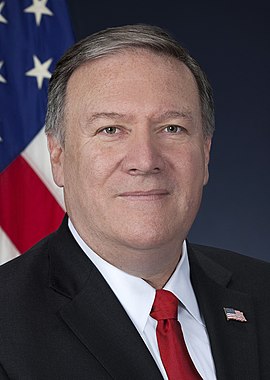
Pompeo calls out Canada, China, Russia over Arctic policy. China entitled to ‘exactly nothing.’
U.S. Secretary of State Mike Pompeo stunned onlookers Monday by taking swipes at Canada, China and Russia in a speech to delegates attending the Arctic Council ministerial. Pompeo, along with foreign ministers from the seven other Arctic nations — Canada, Denmark, Finland, Iceland, Norway, Sweden and Russia — is in Rovaniemi, Finland this week for the eleventh Arctic Council ministerial meeting. Pompeo used his speech to call out countries he accused of making illegitimate claims to Arctic territory, citing Canada’s claim to the Northwest Passage as internal waters. The U.S. considers the Northwest Passage to be international waters. >click to read<09:57
US climate objections sink Arctic Council accord in Finland – click to read<10:39
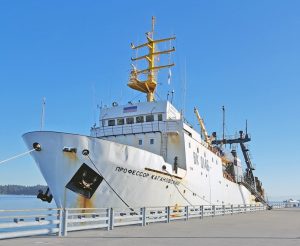
International team of salmon scientists back in port, raring for another mission
The organizer of a month-long Gulf of Alaska salmon survey is already thinking about how to raise money for another trip in the winter of 2020, now that the Russian trawler used in the expedition has finished its job and tied up in Nanaimo. “From what I’ve seen, this needs to be done again,” said Richard Beamish, who came up with the idea of the expedition to mark the International Year of the Salmon with the North Pacific Anadromous Fish Commission. Future surveys would build on data collected by the 21-member volunteer team of international scientists from the five salmon-producing Pacific Rim countries: Canada, Russia, the U.S., Korea and Japan. >click to read<11:52
B.C.-led international expedition to probe ailing Pacific salmon stocks
An unprecedented international collaboration could revolutionize salmon science and fisheries management, return forecasting and even hatchery output. Nineteen scientists from Russia, Canada, the United States, Japan and South Korea are set to probe the secret lives of five Pacific salmon species with a four-week grid search and test fishery across the Gulf of Alaska. The expedition begins next week aboard the Russian research ship MV Professor Kaganovsky. “We know virtually nothing about what happens to salmon once they leave near-shore waters in the Salish Sea,” said expedition organizer Dick Beamish. >click to read<13:56
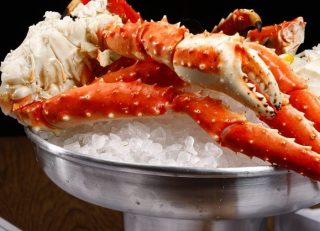
Russia to auction half of crab fishing quotas
Russia will e-auction 50% of the crab fishing quotas for 2018-2019 to create conditions for the entry of new players into the sector, Vedomosti daily said on August 24 citing an official government decree. The world famous Kamchatka red crab is Russia’s “other caviar” and fetches high prices in export as well as being highly valued by the Russians themselves as a favourite delicacy. Russian fishing business has been attracting investors’ attention as fishing is one of the fastest growing Russian agricultural segments and several heavyweight Russian tycoons have been investing into the industry. >click to read<15:03
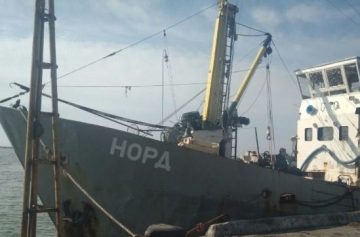
Ukraine and Russia Face Off Over Fishing Boat
On Sunday, Ukrainian border forces detained the Russian-flagged, Crimean-registered fishing vessel Nord in the Sea of Azov, along with her crew of 10 fishermen. The Ukrainian authorities charge that the Nord illegally crossed Ukraine’s maritime borders. In response to the arrest, Russia’s Federal Security Service (FSB) said Wednesday that Ukraine’s State Border Guard Service had “hijacked” the Nord. The shipowner, a collective named “First of May,” has appealed directly to the Russian Foreign Ministry for diplomatic intervention. >click to read<15:37







